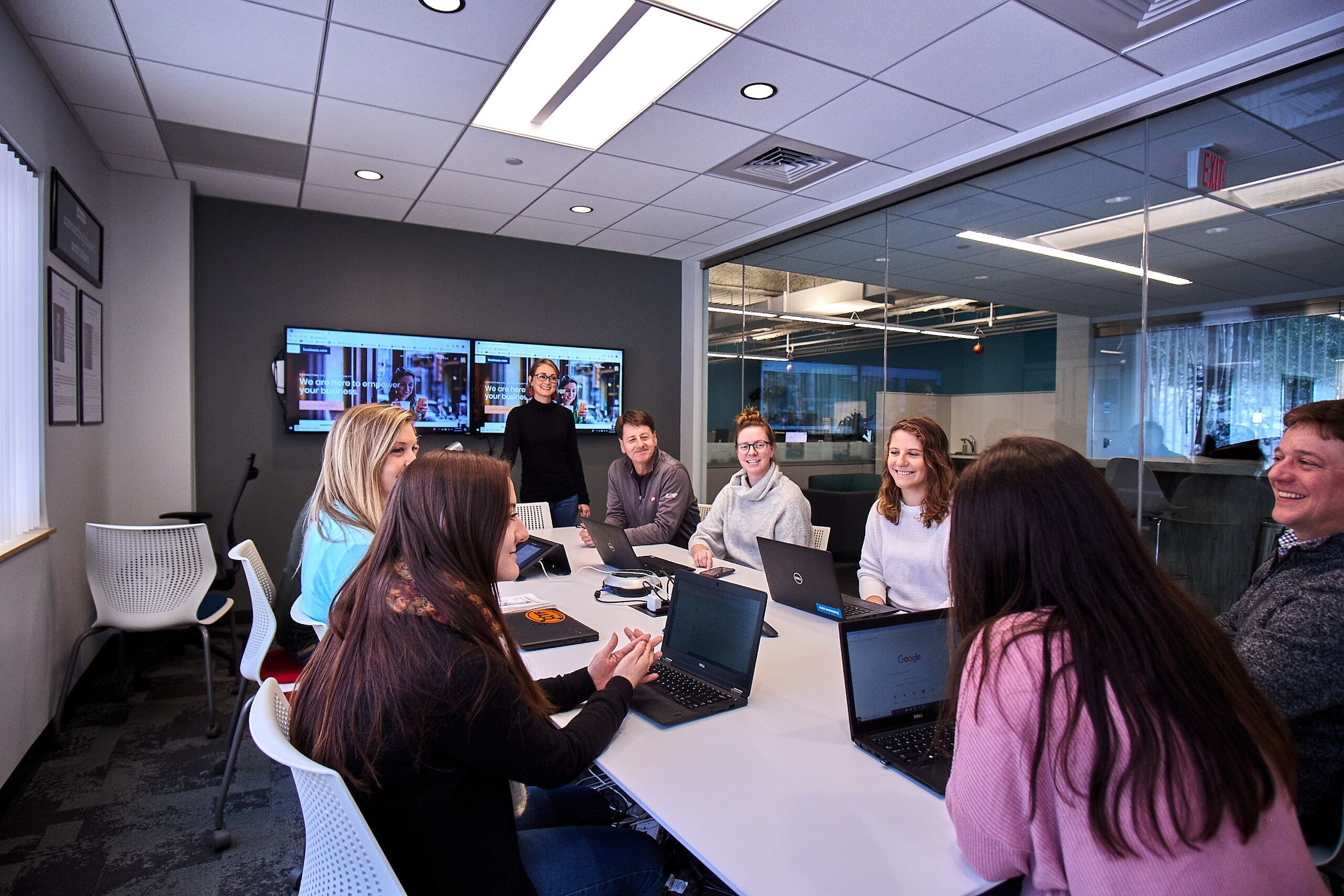Hello!
 Early in 2020, the emerging COVID-19 crisis looked like an existential threat to businesses – perhaps rightfully so. However, as time went by and our understanding of the problem improved, companies have come up with ways of resuming their operations. As one might expect, not all turned out equally effective.
Early in 2020, the emerging COVID-19 crisis looked like an existential threat to businesses – perhaps rightfully so. However, as time went by and our understanding of the problem improved, companies have come up with ways of resuming their operations. As one might expect, not all turned out equally effective.
Having the benefit of hindsight, let’s look at which approaches have proven their worth and what lessons can be learned by other companies.
Making the Work Safe: The Theory
Before we proceed to the examples of safety measures in different industries, it is worth looking into the basics of approaches to mitigating COVID-19 transmission in offices and other crowded places.
 According to the CDC, the entire system of occupational hazard controls can be grouped into five categories:
According to the CDC, the entire system of occupational hazard controls can be grouped into five categories:
- Elimination: Physical removal of hazards
- Substitution: Replacing of hazards
- Engineering controls: Isolating people from hazards
- Administrative controls: Changing the working conditions
- PPE: Usage of personal protective equipment
 In the case of a global pandemic, the elimination and substitution, which are considered the most effective ones, are unfortunately out of the question. Using PPE, on the other hand, despite being relatively straightforward, is not very effective on its own.
In the case of a global pandemic, the elimination and substitution, which are considered the most effective ones, are unfortunately out of the question. Using PPE, on the other hand, despite being relatively straightforward, is not very effective on its own.
For this reason, businesses are advised by the CDC to use a combination of engineering and administrative controls to achieve maximum workplace safety.
The former mostly includes physical modifications like barriers, visual cues, and improvements in air filtration and ventilation.
The latter is more diverse, ranging from health checks and encouragement of respiratory etiquette to the introduction of flexible schedules and the adoption of the work-from-home model. Routine cleaning and disinfection procedures also fall within this category.
 In general, the organization-wide change can be achieved based on the three main considerations:
In general, the organization-wide change can be achieved based on the three main considerations:
- Promoting healthy behaviors
- Maintaining healthy environments
- Maintaining healthy operations
Understandably, in certain industries, some measures will be less effective than others, or even not feasible at all. Let’s look at successful examples of approaches that have proven to be successful and how they fit into the scheme above.
Making the Workplace Safe: The Behavioral Aspect
Of all the options mentioned above, the promotion of healthy behaviors arguably has the most sustainable effect. After all, a well-developed habit can produce favorable effects well beyond the office setting. It is also one of the more accessible approaches (as long as it does not require an organization-wide educational campaign), often requiring as little as a strategically placed signage.
 In fact, according to a survey by McKinsey, it is favored by companies: the majority of respondents have already implemented administrative controls that encourage healthy behaviors. In contrast, less than half of companies have made physical changes in their environments.
In fact, according to a survey by McKinsey, it is favored by companies: the majority of respondents have already implemented administrative controls that encourage healthy behaviors. In contrast, less than half of companies have made physical changes in their environments.
This can be either due to logistical difficulties of modifying office layouts or simple cost concerns. Either way, encouraging safe behaviors seems to be both an important aspect of workplace safety and a feasible one for a variety of organizations, especially small businesses.
Healthy Environments: Essential for High-Trafficked Areas
While some companies are relatively free to choose the preferred mode of safety enhancement and can effortlessly switch to work-from-home, businesses that work with people are more restricted in their choices. These firms need to opt for more costly interventions that often involve purchasing and installing new equipment.
 Probably the most familiar example is a plexiglass divider – a sheet of transparent polymer used to separate employees from one another. Interestingly, while the measure is nearly ubiquitous, it is still unclear how efficient it actually is.
Probably the most familiar example is a plexiglass divider – a sheet of transparent polymer used to separate employees from one another. Interestingly, while the measure is nearly ubiquitous, it is still unclear how efficient it actually is.
In other words, the demand for the dividers is driven mostly by our perception of the situation, although it might turn out to be the right move in the future.
Another major aspect of a healthy environment is the presence of disinfection and sanitation procedures. Depending on the business in question, it may cover a range of items and interior elements.
 As a rule, the top priority is given to high-touch surfaces:
As a rule, the top priority is given to high-touch surfaces:
- Desks
- Door knobs
- Handrails
- Light switches
- Keyboards
- Faucets
- Toilets
 For companies that need to deal with high traffic areas or a constant flow of goods, this task becomes far more challenging.
For companies that need to deal with high traffic areas or a constant flow of goods, this task becomes far more challenging.
After all, the majority of inbound objects cannot be sanitized using soap and water.
Thus, they turn to novel solutions like disinfection passages and robots to accomplish tasks that require precision or care.
Safe Operations: The Biggest Hurdle
The most complicated aspect of resuming business is the ability to maintain safety on a policy level. This segment covers everything that falls under the organization-wide decisions and would often overlap with behavioral and environmental aspects covered above. For instance, an employee staying at home due to having a fever is a sign of healthy behavior.
Conversely, the efforts of a company to encourage such decisions is a form of administrative controls for managing healthy operations. For this reason, it can also be difficult to pinpoint the degree to which companies engage in it.
 Moreover, many companies don’t have the luxury of changing their policies – for instance, firms in the entertainment business will understandably have trouble following the CDC’s recommendation to reduce the number of attendees. Still, examples of bold decisions exist, with some businesses leveraging their expertise in the field to diversify their operations and contribute to the global effort of stopping the pandemic.
Moreover, many companies don’t have the luxury of changing their policies – for instance, firms in the entertainment business will understandably have trouble following the CDC’s recommendation to reduce the number of attendees. Still, examples of bold decisions exist, with some businesses leveraging their expertise in the field to diversify their operations and contribute to the global effort of stopping the pandemic.
Multiplying the Benefits: The Combined Approach
As one might expect, capitalizing on any one approach will only get you so far. This is why such efforts need to be coordinated across different levels of the organization and with support from the management. Similarly, modern solutions often combine several layers of protection that cater to different aspects of a safe workplace.
 For instance, a disinfection passage from Sani Pass, which is intended primarily for disinfection of people and goods, is also capable of temperature measurement, mask detection, and data collection.
For instance, a disinfection passage from Sani Pass, which is intended primarily for disinfection of people and goods, is also capable of temperature measurement, mask detection, and data collection.
In other words, such equipment addresses the behavioral, environmental, and operational aspects of workplace safety – something we will probably see more often in the future.
The Takeaway
The current public health crisis has left a sizeable dent in humanity’s social order and well-being. However, when it comes to details, the changes in offices have not been nearly as dramatic as predicted.
 Of course, some businesses had to resort to costly and complex modifications or even venture into new segments, yet the majority opted for less intrusive behavioral modifications.
Of course, some businesses had to resort to costly and complex modifications or even venture into new segments, yet the majority opted for less intrusive behavioral modifications.
In any case, the key to success seems to be in recognizing the multifaceted nature of the problem and creating an equally comprehensive response, which so far has been the most common and efficient response.
Thank you!
Subscribe to our newsletter! Join us on social networks!
See you!






